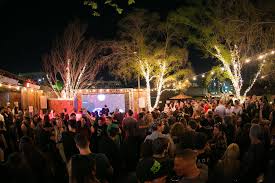 Not all performances take place inside an auditorium where the acoustics are perfect and there is ample power for all that you need to power up. There are some that are in outdoor areas where no power at all is provided for the synthesizers, lighting, and more. What do you do in this case if you are a performer or a DJ? Powering through outdoor gigs can be a major complication, but it is one that is possible.
Not all performances take place inside an auditorium where the acoustics are perfect and there is ample power for all that you need to power up. There are some that are in outdoor areas where no power at all is provided for the synthesizers, lighting, and more. What do you do in this case if you are a performer or a DJ? Powering through outdoor gigs can be a major complication, but it is one that is possible.
Performing Outdoors
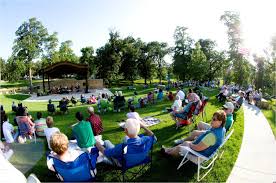 Anytime you have a stage set up outside, there are things you must prepare for. For instance, you should have a covered stage in the event of a sudden rain shower. You need to have lighting so that when the sun starts to set, people can still see the stage and their way around. You must also make sure that your sound comes across without a lot of quality issues since you are trying to fill a wide-open space. This means that you need a lot of power to supply your amplifiers and speakers, lights, and all the other big equipment that helps you produce those quality sounds. It can be tricky, because to do it all, you will need a portable power supply if you are in the middle of a field or a park.
Anytime you have a stage set up outside, there are things you must prepare for. For instance, you should have a covered stage in the event of a sudden rain shower. You need to have lighting so that when the sun starts to set, people can still see the stage and their way around. You must also make sure that your sound comes across without a lot of quality issues since you are trying to fill a wide-open space. This means that you need a lot of power to supply your amplifiers and speakers, lights, and all the other big equipment that helps you produce those quality sounds. It can be tricky, because to do it all, you will need a portable power supply if you are in the middle of a field or a park.
Powering Up Your Performance
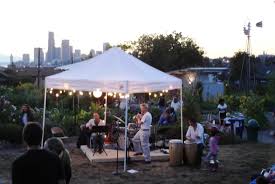 There are quite a few portable power options for you to consider. Most of them, the most powerful ones, come in the form of generators. They allow you to go further out from a power supply without having to run drop cords everywhere. The problem with generators is that not all of them are going to be productive for a live concert because some of them are quite loud. You would not want to have a generator noise interfering with the sound quality of the music or the performance that you have going on stage. You need a generator that makes minimum noise and powerful enough to get the job done. It is possible to find the generator that will work best for you, but you need to have an idea of what it will take to power up everything for your performance before you purchase it.
There are quite a few portable power options for you to consider. Most of them, the most powerful ones, come in the form of generators. They allow you to go further out from a power supply without having to run drop cords everywhere. The problem with generators is that not all of them are going to be productive for a live concert because some of them are quite loud. You would not want to have a generator noise interfering with the sound quality of the music or the performance that you have going on stage. You need a generator that makes minimum noise and powerful enough to get the job done. It is possible to find the generator that will work best for you, but you need to have an idea of what it will take to power up everything for your performance before you purchase it.
How Much Power is Needed?
If you are a DJ hoping to have ample power for your equipment and some lighting, you will most likely be able to stick with a smaller generator. One that is 3,000-4,000 watts could be perfect. However, if you are hosting a live concert and need strobe lights, smoke machines, and a lot of electronics for the stage; more power may be required. A middle ground performance could be a small play or something where you need to power some electronics and some lighting. Luckily, there are generators that provide enough power for anything you want to do, but you will want to choose wisely and read up on the reviews to find out which ones can meet your needs the best. You can also find more information about how much power you really need to host the event that you are hoping to have.
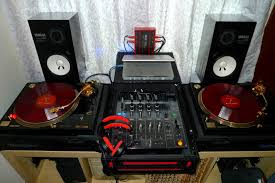 When setting up any type of stage, you have to put forth some effort. Every performance on that stage will have specific needs. The lighting setup for a school play will be different from what may be required for a concert. This complicates things, but only half as much as the setup for a DJ. DJs often travel into areas that are not set up at all and be expected to be great while they are there. This makes setting up the ultimate synthesizer sound show very difficult for DJs.
When setting up any type of stage, you have to put forth some effort. Every performance on that stage will have specific needs. The lighting setup for a school play will be different from what may be required for a concert. This complicates things, but only half as much as the setup for a DJ. DJs often travel into areas that are not set up at all and be expected to be great while they are there. This makes setting up the ultimate synthesizer sound show very difficult for DJs.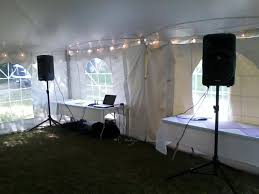 A DJs job goes well beyond playing music. Anyone can play music. They must make sure that it can be heard in all areas of the venue, even if they are outside, and they must make sure that they have lights, a good power supply to power it all, and more. Lights and sound must work together to keep the crowd excited, as if they were at a live concert; by simply playing the tracks that they have available. In short, their job is to turn the music into something memorable.
A DJs job goes well beyond playing music. Anyone can play music. They must make sure that it can be heard in all areas of the venue, even if they are outside, and they must make sure that they have lights, a good power supply to power it all, and more. Lights and sound must work together to keep the crowd excited, as if they were at a live concert; by simply playing the tracks that they have available. In short, their job is to turn the music into something memorable.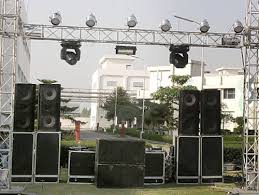 No one hires a DJ just for the sake of hiring one. DJs are at an event because the people who hired them want the event to be memorable. They show up for weddings, business events, birthday parties, and all other large-scale parties. Their “stage” changes with every event. One night, they may be performing inside of a school gymnasium for a dance, and the next night may find them performing at an outdoor wedding reception. They have to be prepared for anything and all of it can be tricky to set up. Inside, lights, smoke makers, and the sound system are easier to setup since they are enclosed spaces. Outside, though, the DJ has a lot of other things to deal with in setting up, especially when it comes to the speakers, since there is no confined area for sounds to bounce off of. If there is a canopy, which most events will have if they are outdoors, the DJ may use outdoor ceiling speakers to ensure that the sound travels well enough to be clear in all areas.
No one hires a DJ just for the sake of hiring one. DJs are at an event because the people who hired them want the event to be memorable. They show up for weddings, business events, birthday parties, and all other large-scale parties. Their “stage” changes with every event. One night, they may be performing inside of a school gymnasium for a dance, and the next night may find them performing at an outdoor wedding reception. They have to be prepared for anything and all of it can be tricky to set up. Inside, lights, smoke makers, and the sound system are easier to setup since they are enclosed spaces. Outside, though, the DJ has a lot of other things to deal with in setting up, especially when it comes to the speakers, since there is no confined area for sounds to bounce off of. If there is a canopy, which most events will have if they are outdoors, the DJ may use outdoor ceiling speakers to ensure that the sound travels well enough to be clear in all areas.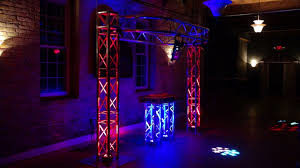 There are a lot of different things that go into setting up a place where performers will take the stage. It requires a great sound system and a lot of lights, especially if you are setting up for an electronic show. Lights and performance is as much a part of the music as the music itself in many “house music” settings where a DJ will be taking center stage. The light setup for shows is crucial when a DJ comes out, because with it, the overall tone of the performance can be set.
There are a lot of different things that go into setting up a place where performers will take the stage. It requires a great sound system and a lot of lights, especially if you are setting up for an electronic show. Lights and performance is as much a part of the music as the music itself in many “house music” settings where a DJ will be taking center stage. The light setup for shows is crucial when a DJ comes out, because with it, the overall tone of the performance can be set.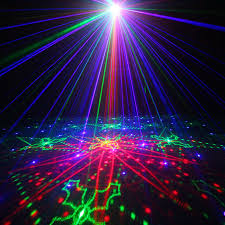 When you go to a club, you may have a DJ instead of a live band. The DJ can use strobe lights to amp people up, soft lights to romanticize the evening for certain songs, and more. At other times, they may use lights to emphasis the smoke that is floating on the floor or use different colors to highlight specific dancers who are truly into the beat at that time. They are a performer who controls a lot of different things at one time. A successful night for them is when the crowd was into their performance and amped up at the right times. The catch is, not all house music is contained in the clubs. There are other venues that play music that must be just as impressive when the DJ walks away at the end of the night.
When you go to a club, you may have a DJ instead of a live band. The DJ can use strobe lights to amp people up, soft lights to romanticize the evening for certain songs, and more. At other times, they may use lights to emphasis the smoke that is floating on the floor or use different colors to highlight specific dancers who are truly into the beat at that time. They are a performer who controls a lot of different things at one time. A successful night for them is when the crowd was into their performance and amped up at the right times. The catch is, not all house music is contained in the clubs. There are other venues that play music that must be just as impressive when the DJ walks away at the end of the night.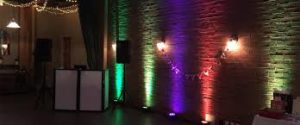 Most all DJs enjoy being center stage so to speak at times. Whether it is while they are waiting on the next band to hit the stage and complete their own setup or when they simply need put the attention on away from those who are dancing so that they can take care of announcements. When they venture out to a big outdoor performance like the Coachella, they must take further steps to ensure that the G4 Bi Pin lights are set up in the right places so that no area of the “dance floor” is darkened when it does not need to be.
Most all DJs enjoy being center stage so to speak at times. Whether it is while they are waiting on the next band to hit the stage and complete their own setup or when they simply need put the attention on away from those who are dancing so that they can take care of announcements. When they venture out to a big outdoor performance like the Coachella, they must take further steps to ensure that the G4 Bi Pin lights are set up in the right places so that no area of the “dance floor” is darkened when it does not need to be.